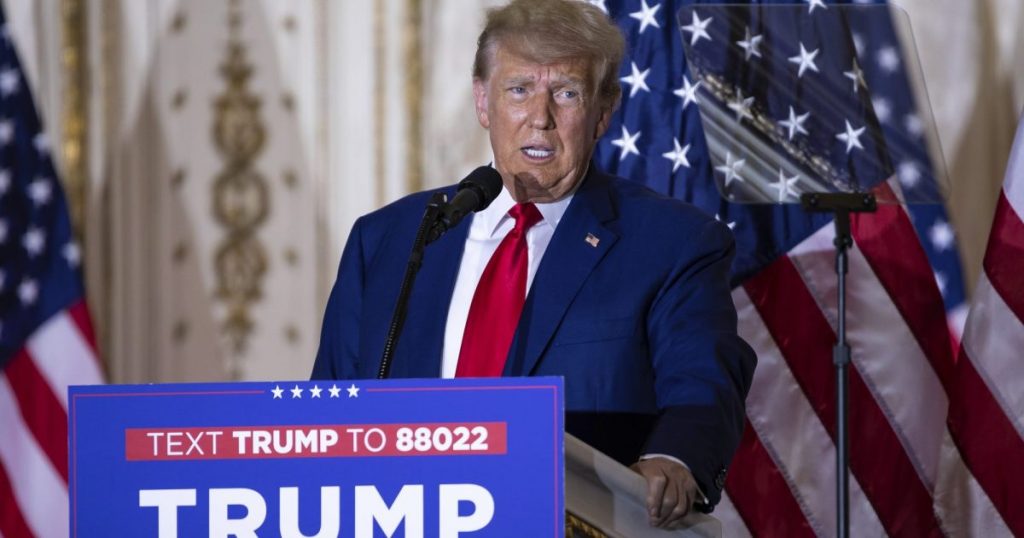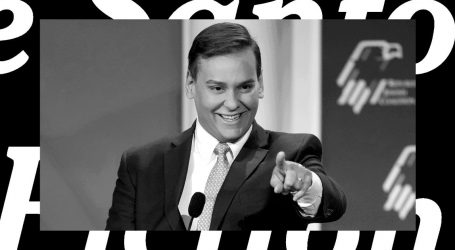What Happens if Donald Trump Simply Refuses to Disclose His Finances?
Francis Chung/POLITICO via AP
Fight disinformation: Sign up for the free Mother Jones Daily newsletter and follow the news that matters.Former President Donald Trump has missed the deadline to file a personal financial disclosure—a requirement of all presidential candidates shortly after they announce their campaigns. It’s a simple document in which politicians are supposed to make public their assets, their liabilities, and their sources of income. The idea is to give voters some transparency about the possible financial motives of the person they’re voting for. But, like so many other norms, Trump appears to be flouting this basic rule, and there may not be much anyone will do about it.
During his 2016 and 2020 campaigns—as well as his time in the White House—Trump was relatively prompt with his financial disclosures. In fact, as part of Trump’s schtick as a wealthy businessman, he seemed eager to release the reports. But he last filed a disclosure in early 2021, after leaving office, covering his final months in the presidency. That disclosure showed his finances had taken a big hit from the pandemic and his tumultuous time in office. His new candidacy, announced on Nov. 15, should have triggered a new batch of disclosures within 30 days of his announcement, but none have appeared.
Trump did successfully ask the Federal Election Commission for two extensions in order to have time, his attorneys said, to compile all the necessary paperwork. Extensions like that are not uncommon, and Trump has used them before, but the last extension expired on March 15. Trump’s campaign attorneys requested another 30-day extension, but the FEC, an independent agency that regulates campaigns, denied that request. According to an FEC letter obtained by RawStory.com, Trump may now face a $200 late fee if he doesn’t file by Sunday.
That’s obviously a tiny price for Trump to pay. But that’s theoretically not the end of it. Trump is still required to file those disclosures, and if he doesn’t, he could get into more trouble. Could.
The FEC is an agency that is struggling to enforce much of anything these days. While candidates mostly continue to file their campaign finance reports, detailing who they have raised money from and how they’ve spent the cash, the agency has failed to impose meaningful penalties for violations over the last decade. The reasons are complicated, but they start with the fact that the FEC doesn’t have any enforcement power of its own. If there’s a problem, it can send a matter to the Department of Justice to take up.
Which leads to the second problem: the commission that manages the agency is stacked with three Democrats and three Republicans, and for years, these commissioners have deadlocked on major issues—which means no enforcement happens. If Trump ultimately refuses to file his personal financial disclosures, it would take a majority of the commissioners—presumably all three Democrats and at least one Republican—to refer the matter to the DOJ.
Then Attorney General Merrick Garland would have to make a decision to pursue the matter further. If he does, and if the DOJ succeeds, Trump could face civil penalties of up to $50,000.
In other words, Trump could, eventually, face an actual consequence for not filing his personal financial disclosures—but it would require both the FEC and the DOJ to decide they want to have that fight.
If Trump were to retake the presidency, he would also be required file disclosure forms with the Office of Government Ethics. During his years in the White House, Trump regularly filed his OGE disclosures relatively promptly. If he fails to do so during a future term, he could face a separate set of potential penalties.
Given that Trump’s attorneys have asked the FEC for additional time—rather than saying they simply won’t comply—it seems likely that at some point Trump might file. The better question right now might be, why hasn’t he? His personal financial disclosures in the past were pretty detailed—it’s why the public learned so much about his large loans from Deutsche Bank, and how much he was—or was not—making from his resorts.
Those past disclosures also caused problems for Trump. From the beginning, Trump included a strange loan to himself worth at least $50 million that was the subject of a Mother Jones investigation. And the current legal trouble Trump faces over his payments to Stormy Daniels is linked to his past personal financial disclosures—initially Trump failed to mention the payments, but he later updated his forms to say that he had reimbursed his attorney, Michael Cohen. Even that update doesn’t appear to have been the full truth, with the actual payments to Cohen being much larger than what Trump reported.
Another reason Trump may be reluctant to file anything—or may be having trouble putting together his financial disclosures—relates to the $250 million civil fraud lawsuit filed by New York Attorney General Letitia James, which accuses Trump of lying to banks and insurance companies about how much his various properties are really worth. Over the course of that investigation, details revealed by James led Trump’s longtime accounting firm, Mazars, to resign, saying it could no longer verify the accuracy of his financial statements. A new accounting firm has since taken over.





